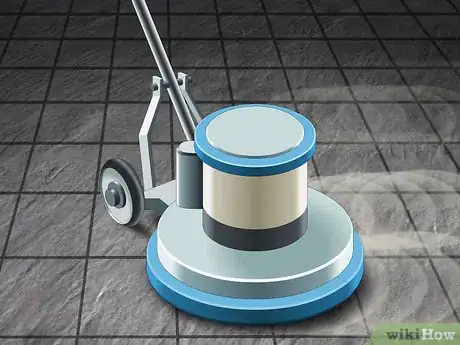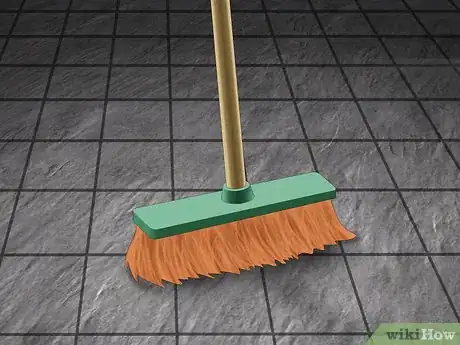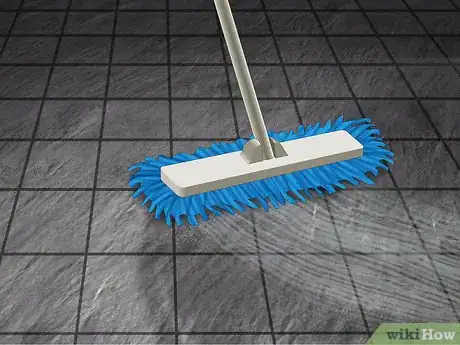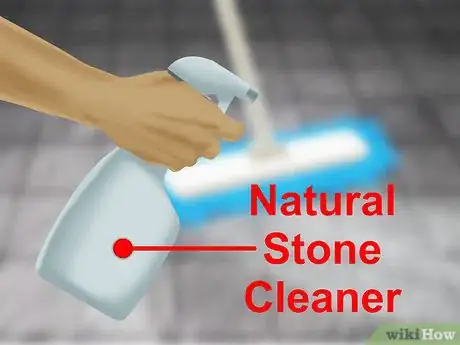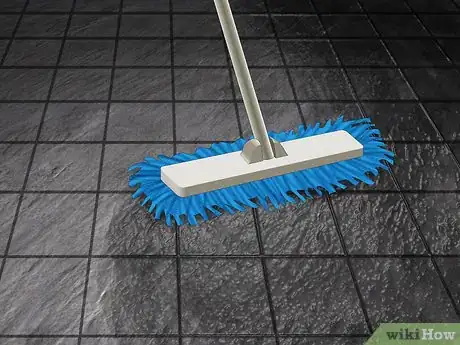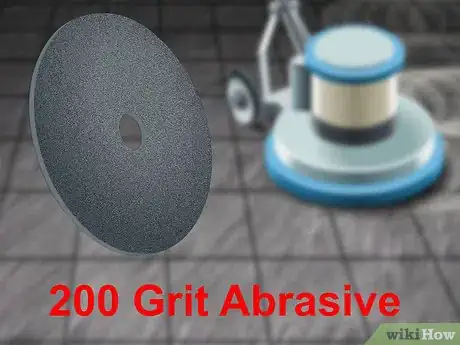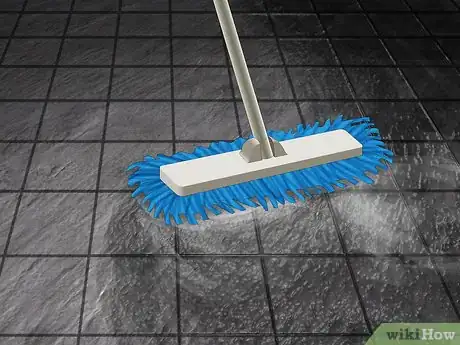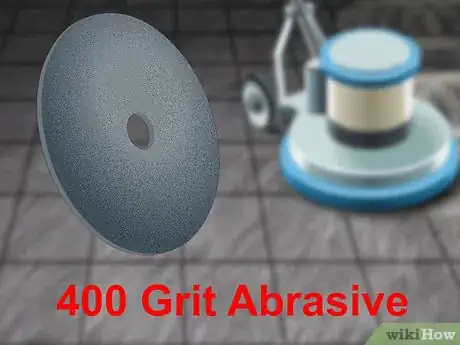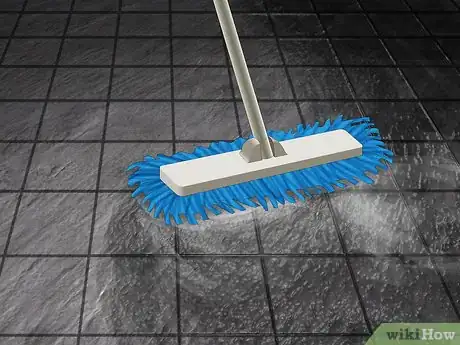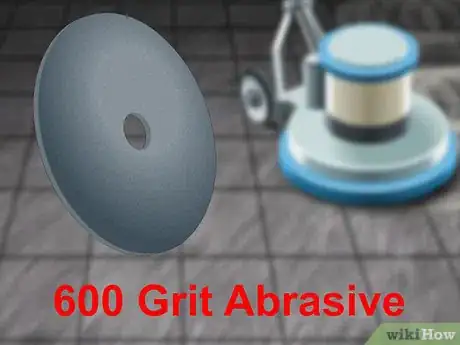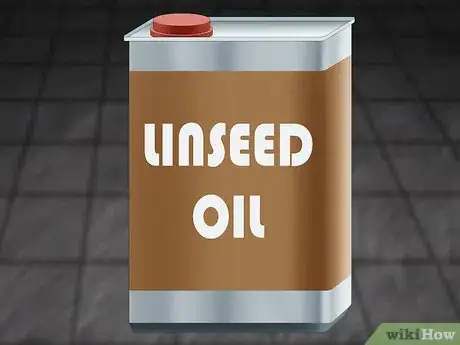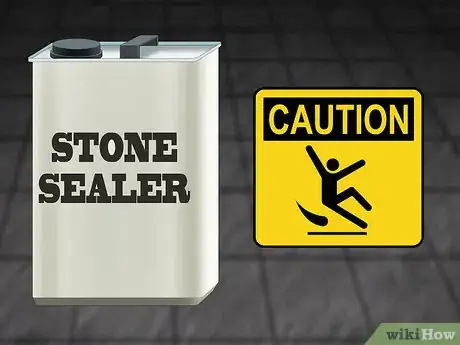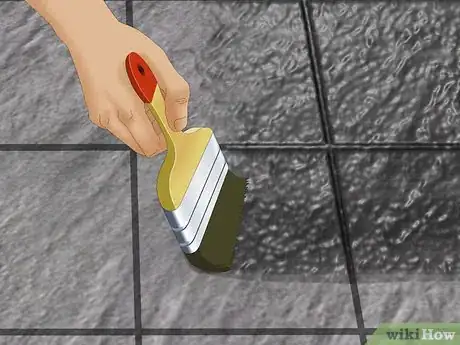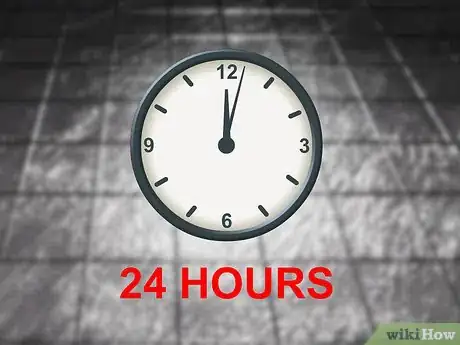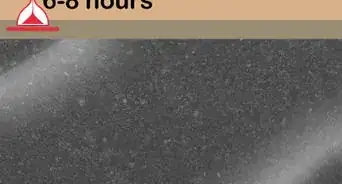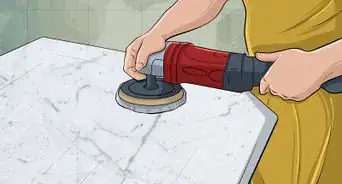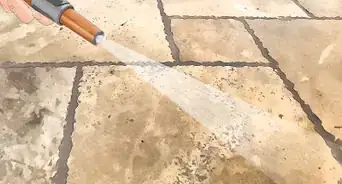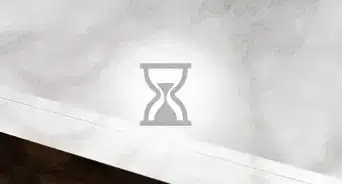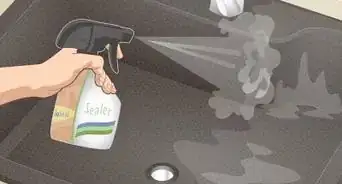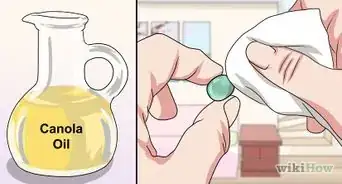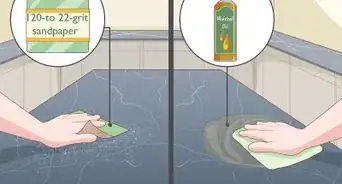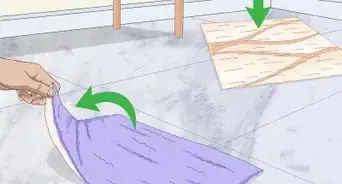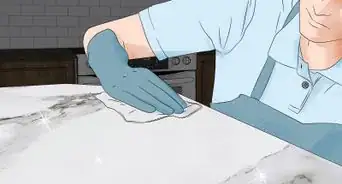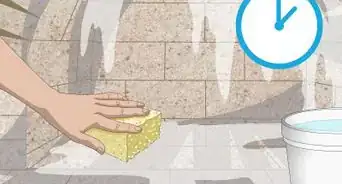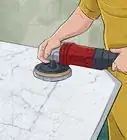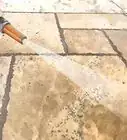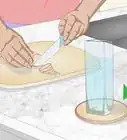This article was co-authored by Jon Gholian. Jon Gholian is a Cleaning Specialist and the Founder of Cleany, a home and office cleaning concierge service based in New York City, New Jersey & Miami. Cleany specializes in providing quality cleaning and handyman services to all their customers. All Cleany employees are insured, bonded, and professionally trained. Cleany has been featured in the New York Times, Bravo & Redfin.
This article has been viewed 106,460 times.
Slate is a fine-grained material used on roofs, as tile, or in furniture. Because it is composed of tiny minerals, such as quartz and hematite, slate often gives off an attractive sparkle. While you can polish slate, the result can be slippery and more difficult to clean. Consider regular cleaning and buffing as a simpler alternative.
Steps
Cleaning the Slate
-
1Strip away dirty wax if necessary. If the slate is covered in a layer of discolored or cracking wax, this needs to go before you can clean and polish it. Select a commercial floor stripper appropriate for stone and dilute with water according to label. Mop this over the floor and let dry, then rinse if directed by the label.
- Floor strippers are powerful chemicals. Protect yourself with goggles, rubber gloves, and excellent ventilation.
-
2Clear away dirt and debris. Sweep the slate using a soft broom.[1] If you are handling slate tiles, make sure you remove all debris from the grout.Advertisement
-
3Clean the slate with soapy water (optional). If your slate looks dirty or streaky, clean it before you start polishing. In most cases, mopping with warm water and plenty of soap will be enough to remove the dirt.[4] Rinse thoroughly to remove soap suds, then let dry until the slate looks dull and uniform.
-
4Remove stubborn stains. If you clean the slate twice and still see grime, move on to stronger cleaners. An alkaline (high pH) cleaner such as ammonia-based glass cleaner or natural stone cleaner is your best bet for slate. If that doesn't work, rinse it off and try a mild acidic cleaner.
- Your best option is an alkaline commercial cleaner from a home improvement store, specifically for slate or at least for natural stone.
- Test all cleaners on a corner first. Acid can discolor some types of slate.[5] Alkaline cleaners are less likely to cause damage, but this is not guaranteed.
Buffing to a Smooth Surface
-
1Wet the stone. Wet the slate thoroughly. Buffing while dry may cause further scratches.
-
2Buff with wet 200 grit abrasive. Buy 200 grit diamond pad or wet & dry sandpaper from a hardware store. Wet the abrasive, then rub it gently over scratched areas until the scratches are less visible.
-
3Rinse all materials. Rinse off the slate and the abrasive to ensure that no dust remains to cause further scratches.
-
4Repeat with 400 grit abrasive. Move on to a 400 grit sanding surface. Once again, wet the slate and the abrasive, then start buffing. Rub it over a wider area this time to ensure a more uniform look.
-
5Rinse again. Wash the dust off thoroughly from all materials.
-
6Finish with 600 grit abrasive. Wet the slate and the 600 grit abrasive. Buff over the entire slate surface. Continue rubbing until the scratches are no longer visible. Rinse thoroughly when finished.
Creating a Glossy Surface
-
1Consider linseed oil. A small amount of linseed oil will create a dark shine on the stone without causing damage. However, oil attracts dirt and makes the slate harder to clean.[6] For this reason, oil is not recommended for floors or outdoor surfaces.
-
2Learn the pros and cons of sealer. Stone sealer can create as glossy a surface as you like, but can make it very slippery, especially when wet. If the slate is outdoors or in an unheated room, water can seep under the sealer and crack off the sealer when it freezes and thaws.
- Slate can be honed (smooth) or rough (with small jagged edges). Sealer is more effective on honed slate.
-
3Apply the sealer. If you do decide to apply a sealer, find one specifically designed for slate or at least natural stone, preferably a penetrating sealer for long-lasting protection. Apply a thin layer with a paintbrush, following the grain of the slate. Let dry for two hours (or as the label recommends), and reapply as necessary.
- Test the sealer on a corner to ensure it results in the desired gloss/matte, slip resistance, and color.
-
4Let the sealer dry. Wait for at least 24 hours before walking over the fresh sealer.
Expert Q&A
-
QuestionWhat are the things I can use to clean slate?
 Jon GholianJon Gholian is a Cleaning Specialist and the Founder of Cleany, a home and office cleaning concierge service based in New York City, New Jersey & Miami. Cleany specializes in providing quality cleaning and handyman services to all their customers. All Cleany employees are insured, bonded, and professionally trained. Cleany has been featured in the New York Times, Bravo & Redfin.
Jon GholianJon Gholian is a Cleaning Specialist and the Founder of Cleany, a home and office cleaning concierge service based in New York City, New Jersey & Miami. Cleany specializes in providing quality cleaning and handyman services to all their customers. All Cleany employees are insured, bonded, and professionally trained. Cleany has been featured in the New York Times, Bravo & Redfin.
Cleaning Specialist You can use a soft broom, a vacuum cleaner with a soft brush attachment, dish soap, and warm water.
You can use a soft broom, a vacuum cleaner with a soft brush attachment, dish soap, and warm water. -
QuestionHow can I laminate slate?
 Community AnswerYou should consult a flooring expert to ensure that it is done properly.
Community AnswerYou should consult a flooring expert to ensure that it is done properly. -
QuestionCan I use a penetrating enhancing sealer over the linseed oil?
 Community AnswerNo, the oil will prevent it sticking to the slate, you will have to degrease it first.
Community AnswerNo, the oil will prevent it sticking to the slate, you will have to degrease it first.
Things You'll Need
- Soft-bristled brush or broom
- Vacuum
- Mild dishwashing liquid
- Water
- Bucket
- Mop
- Alkaline cleaner
- Wet & dry sandpaper, or diamond pad (200, 400, and 600 grit)
- Natural stone sealer
References
- ↑ Jon Gholian. Cleaning Specialist. Expert Interview. 15 December 2020.
- ↑ Jon Gholian. Cleaning Specialist. Expert Interview. 15 December 2020.
- ↑ http://www.howtocleanstuff.net/how-to-clean-slate-floors/
- ↑ Jon Gholian. Cleaning Specialist. Expert Interview. 15 December 2020.
- ↑ http://www.slate-stone.com/slate-cleaning.html
- ↑ http://www.stoneworld.com/articles/82868-solving-slate-flooring-problems
- ↑ http://www.howtocleanstuff.net/how-to-clean-slate-floors/
- Buffing method adapted from http://www.rusticstone.net/how-to-polish-slate-and-stone/
About This Article
To polish slate, start by wetting it thoroughly, which will help prevent scratches while you're buffing it. Then, gently buff the slate using 200-grit sandpaper until the scratches are less visible. Next, rinse the slate off with water and repeat the process, this time using 400-grit sandpaper. Finally, rinse the slate off with water again and buff it one more time with 600-grit sandpaper. If you want the slate to have a glossy finish, apply some linseed oil or a stone stealer. To learn how to clean slate before polishing it, including how to remove old wax, read on!
